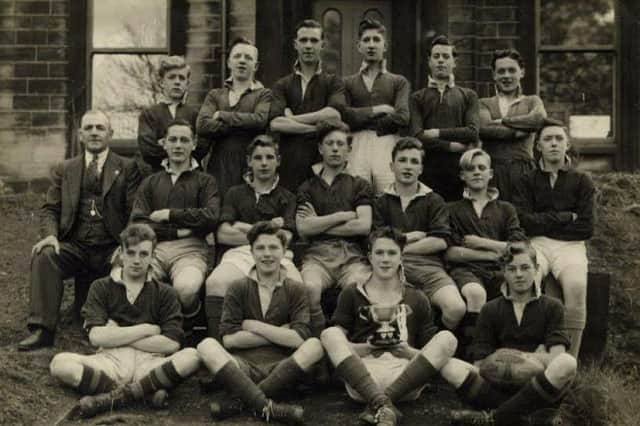Nostalgia with Margaret Watson: The YMCA in Dewsbury was a godsend for our men


Margaret Watson writes: There were churches and chapels of all sizes and denominations on nearly every street corner and nearly always well filled.
Most villages had two or three places of worship and in the town centre alone there were seven.
Advertisement
Hide AdAdvertisement
Hide AdFor many people the church, whether high or low, was the centre of their lives, both spiritually and socially.
Many organisations and societies were formed under their guidance, none better than those which looked after the well-being of young people.
One such group was the Young Men’s Christian Association, better known as the YMCA.
Its headquarters was a large stone house in its own grounds, now long gone, at the bottom of Leeds Road on the corner of Highgate Road.
Advertisement
Hide AdAdvertisement
Hide AdMany younger readers will remember this building better when it was converted into a council run youth club under the name of Manorcroft.
Some time ago I received a letter from Ray Brace, who had been a member of the Dewsbury branch of the YMCA in the 1940s.
Ray, who would later become manager of the Empire Theatre, spent nearly every evening as a teenager at the club when it was run by Mr Ogden, who always arrived at the meeting on his motorbike.
He has many happy memories of those days and remembers when there was something going on every night, especially rugby, football and cricket training.
Advertisement
Hide AdAdvertisement
Hide AdThere were also pie and pea suppers, quiz nights and trips to the seaside during school holidays.
Ray, who attended Wheelwright Boys’ Grammar School, feels that children today miss out on a lot of the activities which the YMCA provided.
The building, which once provided sporting and social activities for young people, is no longer with us and, like many other fine, Victorian buildings, was demolished to make way for housing.
The first YMCA club in Dewsbury was formed as far back as 1874 by a group of young men, under the guidance of a number of clergymen.
Advertisement
Hide AdAdvertisement
Hide AdIts main aim was to improve the spiritual life of members and the first meeting was in the old Mechanics Institute on Church Street with 27 young men signing up to become members.
A number of church ministers attended and the Reverend Henry Sturt, who acted as chairman, spoke of the advantages which would accrue from the formation of such a society in Dewsbury.
Local churchmen at the meeting expressed concern at the growing number of young men who congregated in large numbers in the streets of Dewsbury at night.
Some they recognised as former Sunday school scholars who had attended their church, but sadly no more.
Advertisement
Hide AdAdvertisement
Hide AdIt seemed, they said, that these young men had nowhere to go in the evening and their spiritual life was at a low ebb.
One minister present said these young men were fast becoming proficient in vice and ruffianism, and felt something had to be done to save them.
Another clergyman wanted Dewsbury’s first YMCA club to become a home for these young men, a place where they would always find a cheerful fireside.
He hoped the association would be a good society in which a young man could feel perfectly at ease.
Advertisement
Hide AdAdvertisement
Hide AdBut he also wanted it to be a kind of church, an undenominational one in character which would welcome young men of all faiths and attend to their moral and spiritual health.
He also hoped it might culminate in a thorough revival of religion among the Christians of Dewsbury.
It is interesting to note what Dewsbury was like during the first year that the YMCA was formed in the town.
It was, of course, very much different to what it is today, especially in the town centre where the town hall was yet to be built.
Advertisement
Hide AdAdvertisement
Hide AdThere was no library, museum or public swimming baths as we know them today.
There were few schools and no hospitals, but there was a workhouse for the poor and destitute, always well-filled, especially when Dewsbury was hit by a virulent epidemic of smallpox.
Children were forced to leave school at the age of ten and eleven to work in the factories and coal mines.
If they committed any crimes, the punishment was harsh.
Magistrates didn’t take their young age into account and many Dewsbury children were sent to prison for crimes which today would be regarded as trivial.
Advertisement
Hide AdAdvertisement
Hide AdThe very week that the Dewsbury YMCA club was opened, a young girl of ten, Emma Callaghan, appeared at court for stealing a spice cake from the shop of John Dawson, of Nelson Street.
She had appeared at the court previously for stealing a quantity of firewood and had been sent to prison for seven days.
For stealing the spice cake, she was sentenced to one month, and ordered that at the end of her sentence, she would be sent to a reformatory for five years.
That same week a public meeting was held in Westtown, which had been convened by sending round the bellman.
Advertisement
Hide AdAdvertisement
Hide AdThe meeting was held to present the bad state of public health in Dewsbury chiefly caused by the ravages of smallpox which was very prevalent in the town and had proved fatal to many.
An editorial in the Reporter that week on the subject read:
“Smallpox is spreading and several more deaths have occurred. It is hardly surprising that smallpox should get the hold it has for the want of a proper system of drainage in the town.
“This disease stalks abroad unchecked, but if the sanitary committee had worked as it ought, we believe many valuable lives would not have been sacrificed.”